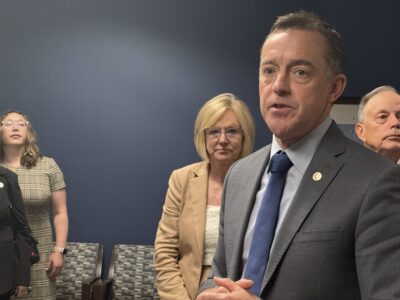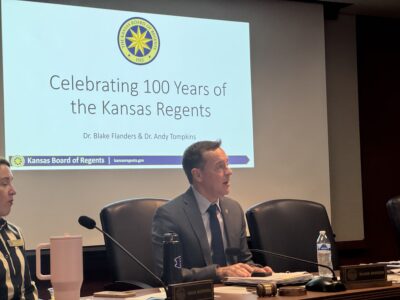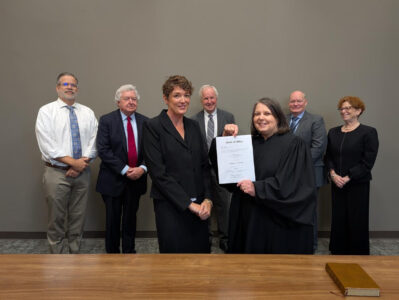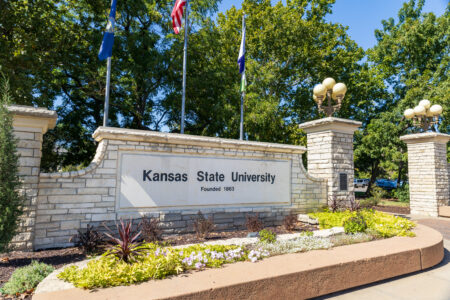Bill to restart horse racing in Kansas wins legislative approval; rural Baldwin farm has been a champion of the effort
With millions of state incentives, horse racing could resume in fall 2026

photo by: Submitted photo
The track at Eureka Downs is pictured.
Barring a surprise at the wire, professional horse racing is set to return to Kansas.
State lawmakers have given final approval to a bill that creates potentially millions of dollars per year in funding to help restart horse racing and the horse breeding and stabling programs that come with the industry.
The measure — Senate Bill 21 — is now awaiting Gov. Laura Kelly’s signature, but it was approved by large margins in both the Kansas House and the Senate last week, meaning that lawmakers likely would have the votes to override any unexpected veto of the bill.
“We are all just crossing our fingers,” Peach Madl, a Lawrence businesswoman who raises Thoroughbred horses on her family’s Baldwin City farm, told the Journal-World on Tuesday. “We have worked hard on it. We need it. It is silly that we don’t have this sport in a state that is all cowboys and cowgirls.”
As the Journal-World reported in February, Madl Farms has become a champion for the idea of bringing horse racing back to the state after the industry withered away in the 1990s and early 2000s. The farm just outside of Baldwin City has racing Thorougbreds of its own, and also stables a stud Thoroughbred that is part of a plan to increase the number of Thoroughbreds born and raised in the state.

photo by: Chad Lawhorn/Journal-World
Sha Harmon and Peach Madl carry a jockey figurine on Feb. 3, 2025 at Madl Farms in rural Baldwin City.
Madl thinks the earliest that horse racing could resume in the state would be the fall of 2026 at the historic Eureka Downs race track. That facility — in a small town of about 2,300 people an hour east of Wichita — is set to benefit from the new state law. The law will continue to provide the track funding to make improvements to its facilities, including work on the stables and the track itself.
The money to fund the improvements is coming from a new form of gambling that Kansas lawmakers approved in a previous session. Billionaire Kansan Phil Ruffin, owner of major Las Vegas casinos, is in the process of building a new casino-like property in Park City, just outside of Wichita. Instead of slot machines and blackjack tables, though, the Golden Circle Casino only will have gambling devices known as Historic Horse Racing Machines.
The devices look like slot machines, and if you so choose, you can play them much the same way by pushing a button every few seconds and waiting for a machine to deliver your fate. But legally, an HHR machine isn’t a slot machine. Instead of being controlled by a random number generator, winners and losers are determined by the results of actual horse races that were run at some point in history.
Bettors are presented with a list of horses and some data about those horses — past results, speed figures, and other such information that horse handicappers use at real race tracks. What bettors aren’t presented with is the actual name of the horses or the date on which the race was won. So, trying to cheat the system by Googling the results won’t be fruitful. Bettors pick winners — either by actually handicapping the horses, or more commonly by pushing a button randomly — and then are shown a quick video clip of the actual race they bet on.
Like slot machines, the State of Kansas will levy a tax on all the money bet through the machines. It is a portion of that new tax that will fund the efforts to rehabilitate Eureka Downs and restart the horse racing industry in Kansas.
While the improvements at the Eureka Downs track are important, Kansas horse farms are excited about two new programs that would reward farmers for raising and eventually racing horses in the state, said Madl, who is best known in Lawrence as the founder of the longtime downtown drinking establishment The Sandbar.
One program, the Kansas Horse Breeding and Racing Fund, would allow the Kansas Racing and Gaming Commission to fund a program that pays horse owners who raise and stable their horses in Kansas monetary rewards based on the number of times their horses race and how they perform. Such breeding programs are common in almost every state that has live horse racing, and they often are cited as the key programs that cause horse farms to locate and operate in a state.
Proponents of the horse racing bill argued it is the creation of those horse farms that will have a positive economic impact on small communities throughout the state. The industry will support everything from veterinary practices to feed stores to more specialized professions like jockeys and trainers.
But Madl said a big benefit is that it will give traditional farmers another income source to consider. Stabling horses for owners can be lucrative. She said her farm can make more money doing that than it can by using its pasture to raise a cow/calf pair.
She thinks the state stands to attract outside money as well, given that Missouri doesn’t have horse racing. She said there are people in Missouri interested in owning race horses who will like the convenience of having their horses stabled in Kansas. Horse racing operations in Oklahoma, Arkansas and Iowa — which do have horse racing — also may stable some horses in Kansas in order to be eligible to collect rewards from the new Kansas breeding program.
The second fund created by the state law is the Horse Fair Racing Benefit Fund, which will allow the Racing and Gaming Commission to fund grants to nonprofit horse organizations that could be used to pay for “costs related to lease agreements for land, equipment or other materials necessary to conduct a race meet,” a report from the Kansas Legislative Research Department said.

photo by: Chad Lawhorn/Journal-World
A race horse grazes on pasture at Madl Farms in rural Baldwin City on Feb. 3, 2025.
Eureka Downs could benefit from that fund, but eventually so could other organizations that want to create new race tracks in the state. Eureka, however, will have a head start in the race. The bill states that prior to March 2028, live horse racing in the state is limited to Eureka Downs.
Residents in that small town are hoping a return to racing will produce an economic revitalization in the community.
“It would help Eureka’s economy so much,” Stacy Randle, secretary of the Greenwood County Fair Board, which has been the track’s caretaker for years, told the Journal-World in February. “When racing ended, we lost all of those families. Trainers left, horseshoers left. We had jockeys who lived in town, and they left.”
The expansion of horse racing hasn’t been universally loved across the country. The horse racing industry has been the subject of multiple questions about whether it is doing enough to care for the health of its horses, as some of the biggest names in the sport have been punished for illegal doping.
The bill in the Kansas Legislature, however, drew little in the way of organized opposition from those concerned about that issue, according to a summary of testimony included in the Legislative Research Department report. The Kansas Racing and Gaming Commission also will be responsible for regulating the industry, including employing veterinarians, stewards and other professionals who will be tasked with ensuring the safety of both the horses and the jockeys, a commission spokesman told the Journal-World in February.
The biggest question remaining for the industry — other than the governor’s signature, which is expected within the next week or so — is how much money will be available to the new horse racing programs.
The historic horse racing machines are not scheduled to open in Park City before November. The Legislative Research Department told lawmakers they couldn’t reliably estimate how much tax revenues the machines would generate. However, a consultant told the Journal-World in February that he’s estimating the 1,000 machines will produce about $1 billion in betting activity during the year. The state would receive about 3% of that total, or $30 million, although not all of that money would go to the horse racing programs.
Madl said even a tenth of that total would provide a big boost to getting horse racing restarted in the state.
“This is perfect for the heartland,” Madl said of the potential for the industry to establish itself in Kansas. “We have the ground, we have the farms, we will have all the assets we need.”







